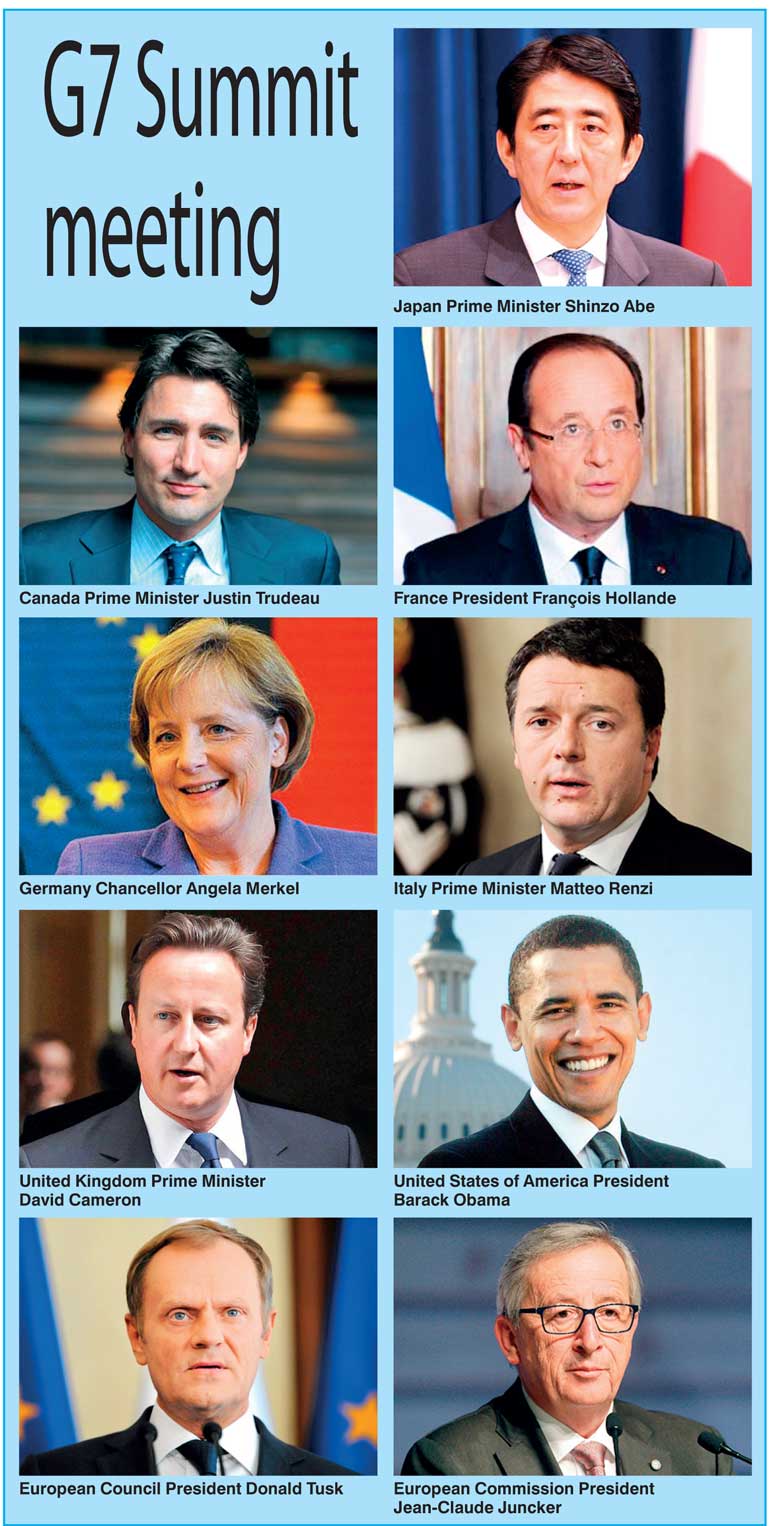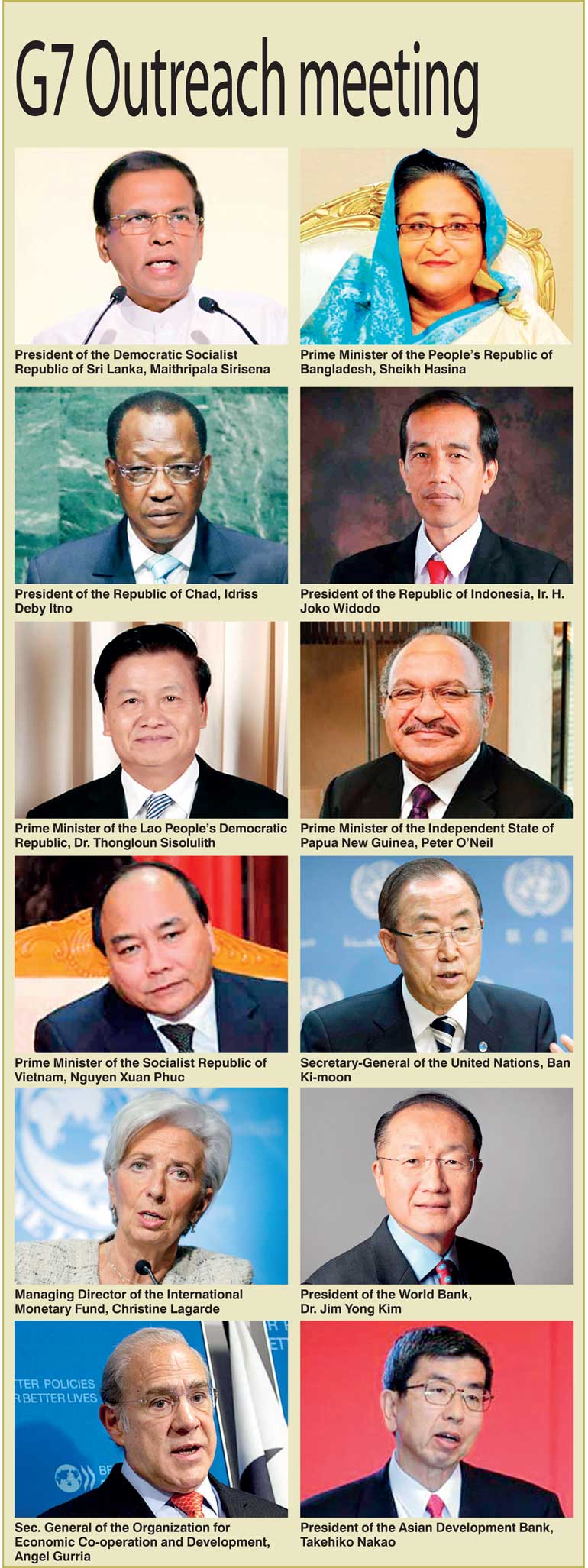Sunday Feb 22, 2026
Sunday Feb 22, 2026
Thursday, 26 May 2016 00:00 - - {{hitsCtrl.values.hits}}
 Japan is hosting the 42nd G7 Summit at which leaders of the member countries Japan, Canada, France, United States of America, Germany, Italy, United Kingdom, who have arrived in Japan, will gather today (26). The G7 Summit meeting is located at Kashikogima, the seaside resort renowned as a cradle of the Japanese pearl industry, belonging to Ise Shima in Mie Prefecture.
Japan is hosting the 42nd G7 Summit at which leaders of the member countries Japan, Canada, France, United States of America, Germany, Italy, United Kingdom, who have arrived in Japan, will gather today (26). The G7 Summit meeting is located at Kashikogima, the seaside resort renowned as a cradle of the Japanese pearl industry, belonging to Ise Shima in Mie Prefecture.
Japan’s Prime Minister Shinzo Abe said that it was a privilege this year to be joined by leaders of seven other countries, Asian and African arriving today, among whom is Sri Lanka’s President Maithripala Sirisena, for the Outreach Sessions scheduled for tomorrow. Unable to conceal his visible anticipation and excitement, he added: “I could not wait any longer.”
He said that the list of challenges for discussions – which he describes as the “G7 to-do list” – is longer than ever. “The world economy has lost traction, emerging economies are losing stamina, terrorism knows no borders, and refugees are risking their lives to flee from terror. The rules-based international order is under serious challenge. Atop all that climate change and ageing is looming in so many of our societies.”
The Japanese Premier declared being committed to the cohesiveness only the G7 can create “one achievable only among the leaders of advanced democracies bound by such shared values as respect for human rights and the rule of law, not merely the consequences of G7’s economic scale.”
He described the three key challenges of the day, with the world economy being the first which is treading on shaky grounds which needs focusing on monetary and fiscal support and economic structural reforms to bolster world economy. It will include tackling corruption, dumping, overcapacity and its root causes and tax evasion.
The second challenge Premier Abe mentioned is global terrorism. A “G7 Action Plan on Countering Terrorism and violent extremism” is to be an outcome of this Summit. The focus in this sphere is expected to be also on cybersecurity.
The third of the three key challenges he described as one not about the present but about the future. “Asia is a region of seascape and thus has rapidly advanced as a global centre of growth. In Asia, where the G7 takes place only once in every eight years, everyone is a child groomed and blessed by the sea.”
The G7 is making a difference in helping accelerate growth in Asia and Africa by committing itself to providing quality infrastructure to developing countries. He said the buzzword is “connectivity” and described Japan as a harbinger in this area.
“Last year my Government, in collaboration with the Asian Development Bank, made a pledge to provide roughly $110 billion under the banner “partnership for quality infrastructure build-ups”.
Moreover Japan announced a policy package on Monday (23) that it will provide approximately $200 billion as its targets for the next five years to promote quality infrastructure investment across the world through “Expanded partnership for quality infrastructure”.

A golden opportunity for Sri Lanka
Thus the G7 is set to help unleash the growth potential yet untapped in Asia. Sri Lanka’s inclusion in the outreach session is an honour, crucial at this juncture for our island nation, a golden opportunity to seize and an appointment to keep, to present its case to the advanced democracies and the seven most powerful nations in the world.
President Sirisena’s style of governance is hailed by many quarters internationally and of him being quietly determined to accomplish his tasks, is acknowledged. The efforts made by Sri Lanka’s Head of State, Maithripala Sirisena through his quiet diplomacy is paying off.
They are the very qualities that influenced a majority of the Island’s people who gave him the mandate for change last year, and if he is to fulfil the tasks he undertook and expedite his action plan for the welfare of the people, which needs to put into first gear, now, he would require all the partnerships and bilateral cooperation he can get to forge ahead together with the international community.
Accomplishing on the front of securing only the assistance financial and technical will not suffice if we are to be the global partners or beneficiaries from these engagements. It will augur well for Sri Lanka to have a team of competent implementers too. The President invited the professionals to return to the country to serve their motherland, and the assurance given to the professionals already in the country of their due recognition and their due place would have to be kept. Assigning them appropriately, the right person for the right job would then be equally crucial for him to deliver the goods as was promised with such international assistance is to be put to good use.
All eyes of Asia and Africa respectively will be on the outcomes of the Outreach Sessions that their respective Asian and African leaders will have with the G7 leaders tomorrow.
Much Kudos to Japan for choosing the earlier little known two cities, Ise and Shima, to hold a summit of such importance and magnitude and the amazing promotional style adopted has attracted an unprecedented amount of interest of the international press. Ise-Shima is on the map as a tourist destination has been reinforced with much vigour – a lesson perhaps our home tourism authorities can learn from. Japan although already developed in the area and mastered the art of promotions had not ever depended on international PR agencies, disclosed one of the organisers. The talents of the locals are on show.
The cities Ise-Shima have risen up to the occasion and the very serene and quiet life of the two cities have livened up. Security has been beefed up to welcome the world leaders of 15 countries – by no means an easy task for Japan with worldwide terrorism threats looming large.
Key people and their issues at Summit
G7 Summit will be the last for US President, Barak Obama after becoming the first African American President in 2009. He will open a new chapter in Japan-US relations through his visit to Hiroshima following the Summit. It will be the first time a sitting US President has visited the city and would strengthen the Japan US alliance. He would seek to lead summit discussions to address the rise of Islamic State militants and issues of the South China Sea, where China’s alleged militarisation of the contested waters is stocking concerns in the region.
British Prime Minister, David Cameron will hope to win backing from other G7 leaders for Britain remaining in the European Union.
This Summit will be the first for Canada’s 44-year-old Prime Minister Justin Trudeau whose cabinet consists an impressive number of 15 women and 15 men besides Trudeau himself, which is notable for its diverse make up, including a former refugee and an aboriginal. He hopes to promote bilateral trade and investment through meetings with Japanese businessmen during his visit to the summit.
Italy’s Prime Minister, 41-year-old Matteo Renzi, who will assume the G7 presidency next year, faces the challenging task of reviving the Italian economy, best by the high youth unemployment. He is thus expected to pitch to accelerate structural reforms and implement fiscal stimulus steps to revamp the flagging global economy at the summit.
France’s President, Francois Holland will call on his G7 colleagues to take united action against terrorism, after his country suffered deadly attacks in Paris last November for which Islamic state militants claimed responsibility for the acts that killed 130 people. As for economic growth he has laid emphasis on fiscal policy in light of the slowing global economy.
Japan’s Prime Minister will Chair the Ise-Shima Summit today (26 May) and seek to lead with compiling fiscal stimulus, monetary policy and structural reform policies to address the slowing global economy and has assured support on health and women’s empowerment. The Japanese Premier has spearheaded the setting of the 42nd Ise-Shima Summit to showcase it fittingly and extended his goodwill to the region with invitations to some of his Asian and African counterparts.
German’s Chancellor, Angela Merkel, praised as Europe’s top power broker, was the mediator in the Ukrainian crisis and led the sealing of the agreement between the European Union and Turkey on stemming the flow of refugees. She is an advocate of fiscal discipline and cautious over taking fiscal stimulus steps to support the flagging economy. She is the first female German Chancellor and the longest serving. This summit will be the 61 year old Chancellor’s 11th appearance at the summit, the most among the G7 participants. Chancellor Merkel introduced ‘Women’s empowerment’ in to the Agenda when she chaired the G7 in Germany last year.